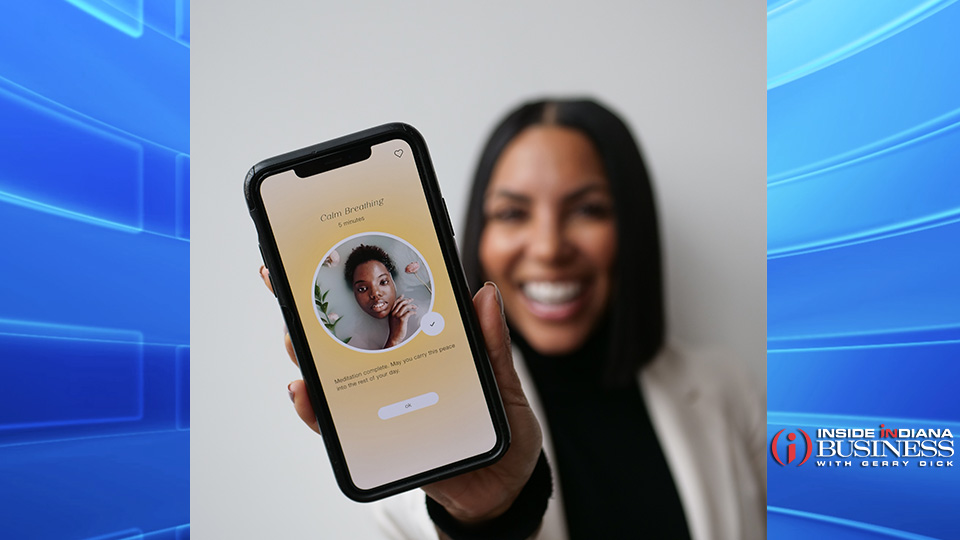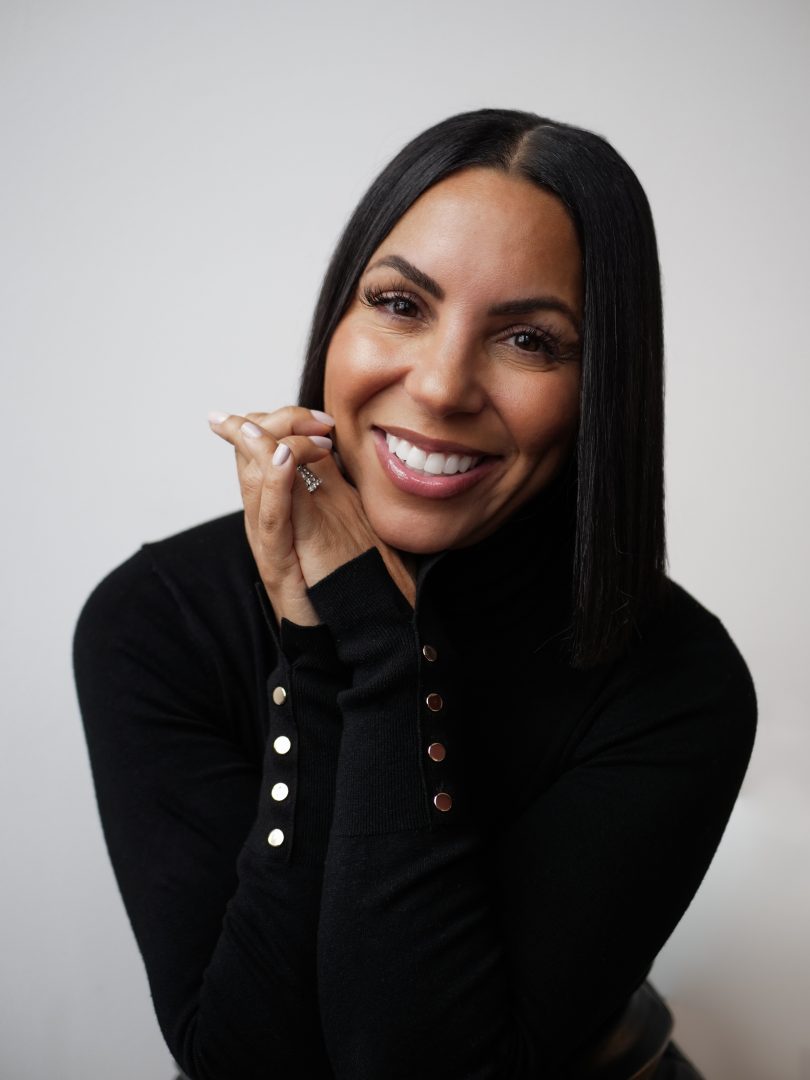New study, Exhale app update prioritize mental health for women of color
Subscriber Benefit
As a subscriber you can listen to articles at work, in the car, or while you work out. Subscribe Now
An Indianapolis entrepreneur says a new study is another step to alleviating mental health care barriers for women of color who often are victims of provider bias and systemic racism.
Katara McCarty commissioned the study in hand with her app Exhale, billed as the first emotional well-being app specifically designed for Black women. The study reaffirms some of her observations and beliefs about Black women’s mental health needs but also provides more data on an understudied demographic and topic.
McCarty is the founder and CEO of tech startup Katecha Corp, which expands health and well-being access to Black women, and the Katecha Cares Foundation, which looks to enact systemic change especially in the realm of responsive and adequate healthcare for Black women.
The study debuts on the cusp of BIPOC Mental Health Month. Mental Health America says on its website how people of color experience a disproportionate amount of mental strife due to historical trauma, oppression and systemic racism constructing an environment weighing heavy on the community.
Founder: Exhale fills a gap in the market and Black women’s lives
McCarty launched the meditation and mindfulness app “curated by BIWOC for BIWOC” in 2020, after she and many others felt the stressors of the pandemic and the ongoing racial justice movement sparked by acts of police brutality.
“As a Black woman, I know that these things happen in our community and to Black people, but to see that play out over and over and over again,” she said, “you could just feel the collective trauma, stress, grief.”
She looked to mainstream mindfulness apps during this time but felt they were missing resources and the focus she needed. When she stepped into those spaces, she said they were typically unintentionally centering whiteness, so she created what she was looking for.
Katara McCarty talks about her upbringing surrounded by strong Black women, the stressors caused by the pandemic and racial injustice and how she came to develop Exhale.
Exhale is steeped in the experience of Black women and provides the representation and care often not seen elsewhere. Opening the platform, there are photos of POC, the voices of POC and programming about the strife and unique experiences of POC. The app speaks directly to “elephant in the room” issues like daily microaggressions, systemic racism and intersectionality.

“Black women have everyday stressors like everybody else, but those stressors are compounded because of systemic racism, because of sexism,” she said.
The app includes programming, breathwork exercises, affirmations and coaching talks. The fact it is a phone app, too, makes it more accessible, she said.
McCarty said it’s important for resources like hers to exist because, especially when it comes to self care, people need to see themselves and find calm in that representation. Without these resources, she said more harm will be done as spaces need to be built to where Black women are seen, heard and can let their guard down.
“Because we’re pushed to the furthest of margins, I think it was refreshing for black women to see themselves reflected back to themselves in an app,” McCarty said. “For them to read that this was actually created for them, to hear the content speak directly to them, and the way in which they’re forced to weave through life.”
Study: Black women need and want mental health resources shaped for their shared experience
The June-released study, titled “The State of Self-Care for Black Women,” collected responses from 1,005 Black women from a range of age groups and socioeconomic backgrounds. Zogby Analytics estimated its survey has a confidence interval of 95% with a +/- 3.1 margin of error.
The report said it sought to fill a gap of survey data regarding Black women’s mental, emotional and physical experience within the context of their intersectional identities.
“What the report really unveils is that Black women want and need more specific resources available to them, to be able to focus on their emotional and mental well-being not just diversity, equity inclusion initiatives within the workplace or within the organization that they may be a part of,” McCarty said.
The report found 72% of those surveyed said they would be more inclined to use such resources if tailored to the unique experiences of themselves — Black women. Those surveyed pointed to systemic issues like racism, discrimination and cultural stigmas as the top barriers to receiving mental health support.
Respondents reported a need to improve workspaces as 66% say they over-exert themselves to excel at work and take care of personal responsibilities and many report the lack of inclusivity and pressure to change stereotypes. Stress was a constant across questions with 61% saying they felt so when taking the survey. They point to a feeling they need to be stronger than the average person, historical trauma and microaggressions as major contributors.
Another topic identified was how over half of women surveyed felt more comfortable with a Black doctor than a white one. About 37% said they feel they need to advocate for themselves to receive adequate care, and 37% said they have experiences provider bias before.
According to a 2015 University of North Carolina study on the topic, most health care providers have some sort of implicit bias positively affecting white people and negatively impacts people of color, leading to health disparities. The Association of American Medical Colleges’ data shows 63.9% of active physicians in 2022 were white compared to the 6.9% who were Black.
All of which falls into a takeaway McCarty hopes to address with her product: Black women need and are looking for culturally appropriate mental health resources.
What’s new on Exhale
Released last week, the app has several new updates catered to short-term stress relief.
The study helped to reaffirm many of the upgrades they were already planning, McCarty said, and they have done app feedback outreach routinely. The new study will inform their future improvements.
“We really have been talking and listening to our users since day one to help really inform us on how to build 2.0,” she said. “There’s a whole diaspora in our community, right, so I want to make sure that we’re listening to our users.”
When the app is opened, an animated breathing orb takes the user through a few exercises. This portion is free.
New meditation recordings for 5-, 10- and 15-minutes also debuted. The user will be asked how much time they have and a program is matched for that period of time. When so many people of color experience microaggressions on a daily basis, McCarty said it’s crucial to add small sessions of self care to the day to decrease stress and relax; taking care of ones mental health doesn’t need to be large chunks of time, she said.
The app also includes more calming sounds with cultural relevancy like calm jazz and rhythmic gospel.
The “Ready to Exhale” podcast is also now available in the app as well as a thought of the day.
Looking forward
Especially during BIPOC Mental Health month but anytime of the year, McCarty said non-POC need to think about how they can create supportive spaces and educate themselves on POC resources.
“Even though it’s not created for you, I think it’s important for you to know about so that you can provide,” she said. “Do your due diligence.”
What this looks like in the workplace, she said, is that non-POC can better engage with their POC colleagues when they need support. It may look like referring someone to a resource or paying for an Exhale membership, she said.
McCarty said she wants to continue pushing on in the “Exhale movement” through classes, panels and another survey. Her goal is to educate people on why this type of care is needed, the effects of racism on one’s mental health and how emotional wellbeing impacts physical health.
“It’s important to educate and to say we cannot we don’t hold the privilege and the power to dismantle these systems,” McCarty said. “But what we can do is take care of ourselves in the midst of these systems.”
